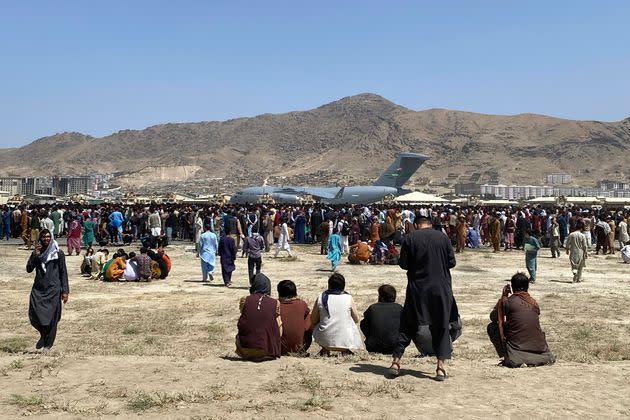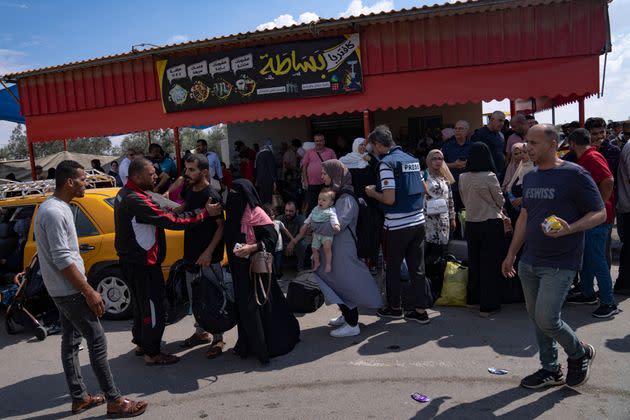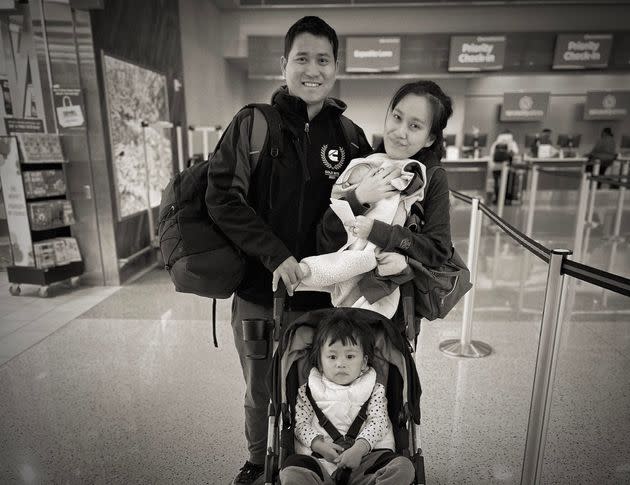The Crucial Immigration Lifelines Inside Congress That Nobody Sees

In the chaos that swallowed Afghanistan as the U.S. withdrew its last troops in August 2021, thousands of Afghans, their friends and their families called anyone they could think of for help.
Jenna Jaffe, the immigration specialist for Rep. Jerry Nadler (D-N.Y.), was one of dozens of congressional staffers who fielded those desperate phone calls.
“They were in a nightmare,” she recalled. A family put her on the phone with a U.S. Marine so she could explain that they had authorization to enter the U.S. as refugees, only for him to hang up on her. “He was like, ‘Ma’am, ma’am, slow down. They told us to look out for documents that are certain colors, and that’s all I know. … Goodbye,’” Jaffe said.
With everything disintegrating, Jaffe and another congressional caseworker cobbled together a group of Capitol Hill staffers who traded scraps of information from the Pentagon and State Department and all-hours updates from constituents in Kabul.
One of those staffers was Nicky Leingang, the director of constituent services for Rep. Ilhan Omar (D-Minn.).
Omar’s office had received more than 2,000 pleas for help. In part this was because of Omar’s high-profile background as a refugee; people had faith she would help. But another reason was Leingang, who over the years had helped countless constituents wrestle with complex immigration cases and had gained a reputation in Minneapolis’ large immigrant community for being unusually relentless. A local immigration attorney said the refrain goes, “Have you called Omar?”

FILE- Hundreds of people gather near a U.S. Air Force C-17 transport plane at the perimeter of the international airport in Kabul, Afghanistan, Monday, Aug. 16, 2021.
Leingang found the events of those weeks just as chilling as anyone.
“You’re on the phone 16 hours a day with people begging for their lives,” they recalled. But their prior experience working complicated immigration cases steadied them enough to concentrate on essentials: How to send American forces actionable requests instead of a fire hose of information. How to help people prove their identities in a war zone.
“There was a lot of basic training going on, and Nicky was already at another level,” Jaffe recalled. “There aren’t a lot of Nickys out there.”
For thousands of people trying to navigate the U.S. immigration system, congressional staffers like Leingang have become an essential lifeline. A combination of Congress’ own failure to pass reforms and deliberate sabotage during the Trump administration has rendered the system so broken and backlogged that even immigrants with nominally uncomplicated applications are running into delays that can last years.
The people calling Leingang for help don’t have years. They want to carry on with their lives — get married, accept a job — or, in extreme cases, escape extraordinarily dangerous circumstances. Since the start of Israel’s military offensive in Gaza in October, Leingang has been helping a torrent of Palestinians flee the war zone.
Congressional staffers can’t bend immigration rules, and they are not miracle workers. Leingang has encountered plenty of cases in which there’s little they can do. But staffers can almost always get a faster response from U.S. embassies and U.S. Citizenship and Immigration Services (USCIS) than could an ordinary person. A select group have learned to wield that privilege for constituents stuck in a bureaucratic quagmire — maybe none more so than Leingang.
“A lot of people in constituent services, they see their job as simply responding to constituents,” said Sandra Feist, an immigration attorney in Minneapolis. “Nicky sees their job as getting constituents what they’re entitled to.”
“Just being in a place where you have the power to do that, it would be kind of wild not to take full advantage,” Leingang said. “This is one of the most important ways we can directly improve our constituents’ lives.”
When we spoke, in December, a surge of constituents and their relatives were calling for help getting out of Gaza, the West Bank and Israel. Leingang can only directly help families with a connection to Omar’s Minneapolis district, although colleagues in other districts said Leingang often helps tee up their cases.
Officially, any American and most of their close family members could board one of the flights the State Department was chartering out of Ben Gurion Airport near Tel Aviv. But thousands of Palestinian Americans couldn’t get to the airport safely, and weeks passed without other meaningful guidance.
Hundreds trapped in Gaza followed U.S. instructions to go to the Rafah crossing, the checkpoint between the region and Egypt, only to find the checkpoint closed and areas near it under Israeli fire. When the checkpoint finally opened, it could take days for peoples’ names to appear on the crossing list.
“I think the State Department, their belief was that everyone who wanted to leave had the opportunity with these charter flights,” Leingang said. “And so why should we be expected to assist them now?’”
Leingang’s role was to mediate between department rules and the horrific reality on the ground.
They were in the midst of carving a safe path for a Palestinian American and his mother to leave Jerusalem. With the older woman in frail health, the two were fearful of going to Ben Gurion, where Palestinians have faced harassment and hourslong security screenings only to board a plane with an uncertain destination. Leingang managed to guarantee they could cross into Jordan to take a commercial flight.

Palestinians wait to cross into Egypt at the Rafah border crossing in the Gaza Strip, on Oct. 16, 2023, trying to find refuge from Israel's relentless bombardment in retaliation for Hamas' brutal Oct. 7 attack.
They helped a constituent’s wife, who was trapped in Gaza, get expedited approval to cross the border into Egypt.
Leingang is also pushing the State Department to use its discretion to accept Palestinians with ties to the U.S. that fall outside the normal criteria — like an elderly couple whose son is a U.S. permanent resident and whose daughter, their caretaker, is married to a U.S. citizen — although so far the department is refusing.
“The Department of State has no higher priority than the safety and security of U.S. citizens overseas,” a spokesperson for the State Department said. “We are aware that this is a difficult situation for U.S. citizens, [legal permanent residents], and their families who are seeking to depart Gaza, and we are doing what we can to assist.”
Leingang started doing this work when they joined then-Rep. Keith Ellison’s constituent services team in 2014. Minnesota’s 5th District covers all of Minneapolis, where 1 in 8 residents was born abroad, and so about half of Leingang’s job consisted of helping constituents in immigration quandaries. Most were people seeking permanent work authorization so they could keep building lives in the district.
“I just kind of have a knack for bureaucratic systems,” Leingang said.“The only real way to get experienced in this area is just by doing it for a while and being creative in how you draw lessons.”
If the U.S. immigration system is an endless hallway with thousands of doors concealing different pathways and stakeholders, Leingang has learned over time which doors open easily and which need a special key, which stakeholders are receptive to helping and which have highly particular requirements.
Leingang didn’t have a background in immigration. But their old boss, Jamie Long, who is now Minnesota’s House majority leader, found it didn’t matter: “Nicky just excelled.”
Before long, their corner of the office was decorated with wedding photos and baby announcements from families the team had helped reunite. Four years later, when Ellison, a Democrat, became Minnesota’s attorney general and Omar became his successor, she chose to keep Leingang on board.
To constituents, Leingang is warm and responsive. When they can’t help, they offer the dignity of a straightforward answer.

Karn and Ray Tintani with their child.
“They took time to understand what the consequences would be to my family,” said Karn Tintani, who moved to Minneapolis from Thailand. When his wife, Patcharida (she goes by Ray in the U.S.) got pregnant, Leingang helped expedite the process to obtain her Social Security number in time to join Karn’s health insurance for her first obstetrics appointment.
Nico Ratkowski, a Minneapolis immigration attorney, recently sought Leingang’s help on behalf of a client whose child wasstuck in Ecuador.
The parent had already obtained permission for their child to enter the U.S., meaning the U.S. Embassy in Ecuador had only to approve their child’s visa. But in order for the embassy to issue a visa, the child had to schedule an interview. In order to schedule an interview, he had to be fingerprinted. And due to COVID restrictions, the embassy was not offering biometric appointments.
It was the kind of circular, Kafkaesque problem that Leingang excels at solving. Within a few weeks, the embassy arranged to open for Ratkowski’s client and soon reopened for good.
“I’ve worked with just about every congressional office in my region,” Ratkowski said. Some never even respond. Omar’s team is so effective that Ratkowski occasionally urges clients to move to her district.

Taliban fighters patrol in Kabul, Afghanistan, Thursday, Aug. 19, 2021.
Leingang’sabilities got wider notice when Jaffe and other staffers organized the Afghanistan working group.
The group ballooned to more than 450 staffers. Today, it is an ongoing source of collective knowledge not only for helping people escape conflict zones — Afghanistan, Sudan and now the Palestinian territories in Israel — but any staffer handling a case of daunting complexity.
Jaffe believes Leingang has probably blazed deeper into the bureaucratic hellscape than any other congressional staffer who works on immigration cases.
At almost the exact time the first Taliban fighters were entering the city limits of Kabul, a baby was born in the city to a parent who was a U.S. citizen. The State Department said there was no way to issue the baby a passport.
“For one year, Nicky basically would not take no for an answer,” Jaffe said. Even Omar made calls until the State Department finally agreed to let Qatar deliver the passport.
Omar, who is the first refugee elected to Congress, said she makes immigration cases a priority in part because she remembers the obstacles her own family faced. She and her family fled the Somali civil war when she was 8 years old for a refugee camp in Kenya.
“I vividly remember my own grandfather trying desperately to get his son to the United States from Yemen and having our then-senator really take that on and do everything possible,” she said. “I want to intervene if I can. … Especially when it’s a case of reunification or helping somebody escape a conflict zone. It brings a lot of joy and relief for all of us.”
Recently, Leingang helped reunite the Ayoubi family. The last time the husband and wife and their two children were all together was in the throngs outside Kabul’s airport in August 2021. Fareed, a longtime transport manager at Bagram Air Base, carried their daughter, a toddler, on his shoulders for two days until the two of them boarded a plane to the U.S. Sameera, a journalist who had received death threats against her family from the Taliban, was pregnant at the time and turned back. She hid with their 6-year-old son at her cousin’s house until they escaped to Pakistan, where their third child died shortly after Sameera gave birth, then Spain.

Fareed and his children celebrate a birthday after being reunited in Minnesota.
In Spain, Sameera and their son became trapped in a bureaucratic eddy. In their rush to leave the country, thousands of Afghans took unique escape routes for which there is no protocol for later entering the U.S. Sameera was seeking humanitarian parole, a rarely used emergency status that the Biden administration was granting to many Afghans — but which the embassy in Spain had limited experience in processing.
With immigration attorneys for the family unable to make headway, Leingang got involved. After painstaking negotiations with USCIS and the State Department, the family finally reunited at a Minneapolis airport terminal in September 2023.
Their daughter leaped into Sameera’s arms, and the whole family collapsed onto the floor. “It was unbelievable,” Fareed said in an interview. “I can hardly imagine that time without crying.”
Most of Leingang’s cases don’t involve conflict zones. “There’s so much hurt and there’s so much harm and trauma that is happening in all corners of the world right now that don’t get the same sort of attention,” they said.
Feist and Ratkowski each rattled off a list of cases in which Leingang made the essential breakthrough. That time a woman needed to leave the Democratic Republic of Congo and join her husband in the U.S. in time to receive critical medical treatment. That time a consulate wanted a client to go to a dangerous country to obtain a document that didn’t exist. That time a performance center almost lost tens of thousands of dollars on a show because a troupe of Mexican comedians weren’t getting their visas in time.
“It’s like waiting against a wall — the wall doesn’t give you any responses,” said Parth, a recent graduate of the University of Minnesota Twin Cities, who asked to be identified only by his first name for privacy.
Parth, who is from India, got offered a job in clean-tech but couldn’t accept right away because of an inscrutable delay with his work authorization. He watched his bank account drain while the government missed one deadline after another until, finally, he called the office of Sen. Amy Klobuchar (D-Minn.) — she had been the commencement speaker at his graduation — which connected him to Omar’s office and Leingang.
Suddenly, USCIS offered answers and updates Parth hadn’t gotten despite spending hours on the phone. “It triggered accountability when the congressional request went in,” Parth said.
“Providing timely responses to requests from members of Congress and questions from applicants and petitioners are equally important to USCIS,” said Matthew Bourke, a USCIS spokesperson.

Sean and Nati pose on their wedding day.
Sean and Nati met in Bogota and dated long-distance throughout the pandemic. When they decided to marry, there was one delay after another — from COVID to Trump’s cuts to consulates and embassies. They sought Leingang’s help around the time someone routed Nati’s paperwork to the wrong email address.
“They understood that it’s so hard to be a world away from the person you love,” Sean said. With Leingang’s intervention, they didn’t have to delay their wedding.
Leingang still has scores of open cases that weigh on them.
“It can feel like we’re screaming into a void sometimes,” Leingang said. DNA processing, which the U.S. uses to confirm identities before issuing birth certificates to citizens born abroad, has ground to a near halt at locations across Africa, causing long delays for many families who fled the war in Sudan.
“We are showing maximum flexibility where legally possible given the current situation in Sudan,” the State Department said in response.
“It takes resilience to be told no, no, no from people at the State Department with very fancy titles — people who don’t necessarily consider direct services important and civilians to be experts — and to push on that,” Jaffe said.
But then there are the successes, Jaffe said, like the baby born in Kabul as the Taliban were sweeping the city. The family’s path out of Afghanistan was long and horrific, but today they are all living safely in Minnesota.
“Someday he’s going to be old enough to understand how many people, and what those people had to do and what they were not willing to do, which was give up,” Jaffe said. “If you’re told no a hundred times and yes one time, that has to be worth it. One baby is enough.”
This article has been updated to correct Karn Tintani’s country of origin.
